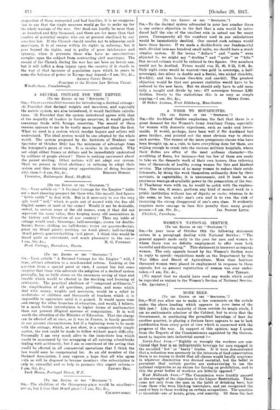MORE BEER.
[To THE EDITOR or ran " Smorsroa."] SIR,—Will you allow me to make a few comments on the article under the above heading which appears in your issue of the 19th us et.? Like the majority of those outside its magic circle, I am no enthusiastic admirer of the Cabinet, but to state that the Government, in continuing the permitted barrelago of beer for another quarter, is playing a furious farce appears to me to limit justification from every point of view which is concerned with the progress of the war. In support of this opinion, may I quote from the Reports of the Commissionere appointed by the Govern- ment to inquire into industrial unrest ?— North-East Area._' Rightly or wrongly the workers are con- vinced that beer is an indispensablo beverage for men engaged in the so-called ' hot' or ' heavy' trades. If it were demonstrated that a reduction was necessary in the interests of food conservation there is no reason to doubt that all classes would loyally acquiesce in whatever diminution was deemed essential, but the belief is prevalent that certain parties are endeavouring to use the national exigencies as an excuse for forcing on prohibition, and to title the great bodies of workers are bitterly opposed."
West Midlands Area.—" The Commission were frankly amazed at the strength of the objections to the Liquor Restrictions. These came not only from the men in the habit of drinking beer, but from those who were life-long teetotalers, and yet recognised the need of beer to these working on certain occupations. The question is threefold—one of hours, price, and scarcity. Of these the hint
is far the most galling. The limitation of hours, though unpopular, has been accepted as a war necessity. The increase of price is resented chiefly becassee it is felt that brewers are making an undue profit, but the real grievance is the difficulty of obtaining the article. It must be remembered that we are dealing with men who all their lives have been accustomed to drink beer ns and when they want it."
I would refer you also to the Labour leaders. You will hardly deny that it is of supreme importance that those demands which the working men and women of this country deem reasonable, and which commend themselves to public opinion, should be satisfied, since any failure in this respect must adversely affect the supply of munitions and all kinds of war material. Any Government who in these circumstances failed to meet such demands would—as far as the safety of the country is concerned—enact a furious tragedy. You state that no appeal for Prohibition during the War has been made to the working man. Surely you have not forgotten the Strength of Britain Movement—whose motto, in view of recent events, might well have been vie corwilii expert, thole ruit sun. Surely the United Kingdom Alliance and Sir Thomas Whittaker, with his short out to Prohibition, have not been idle. No, Sir, if we examine this matter, not from the point of view of controversy but from that of common-sense, we shall find that before you can expect men and women working on long hours at heavy and exhausting tasks to do without their beer, you must look up the Cecil, the Carlton, and the Savoy, and prevent your hypothetical Duke from access to his cellar stairs.
With regard to your suggestion that beer-drinking is a non- nourishing form of food-consumption, again I would refer you to the Trade Union leaders, especially as to the accuracy of your state- ment that "you can get as much beer as you please."
In conclusion, Sir, may I say with all respect that your mental attitude with regard to the action of the Government in this matter would appear to have been foreshadowed by the prophet Jeremiah when he wrote : " The prophets prophecy falsely, and the priests bear rule by their means; and my people lore to have it so; and what will ye do in the end thereof f "—I am• Sir. &c.,



































 Previous page
Previous page